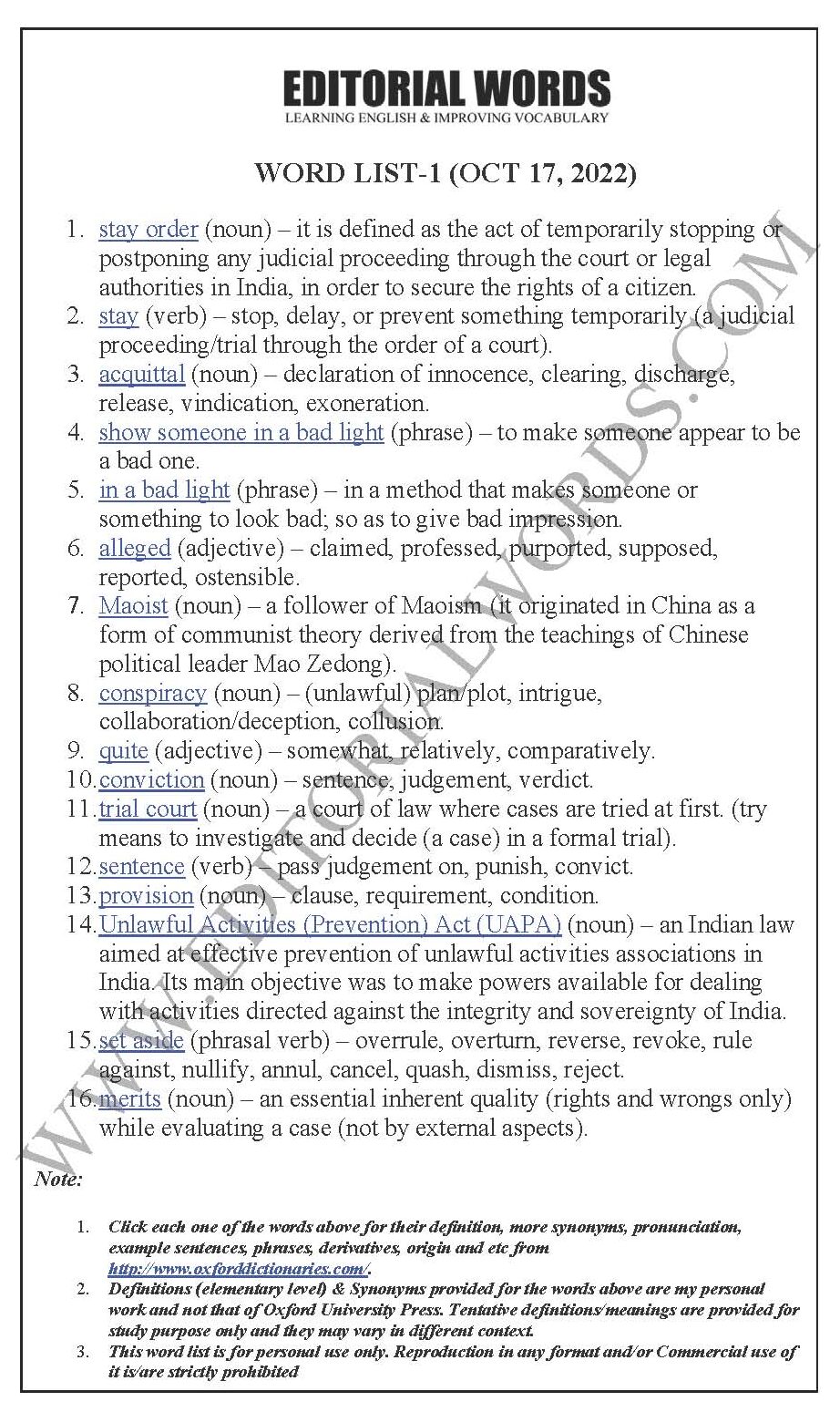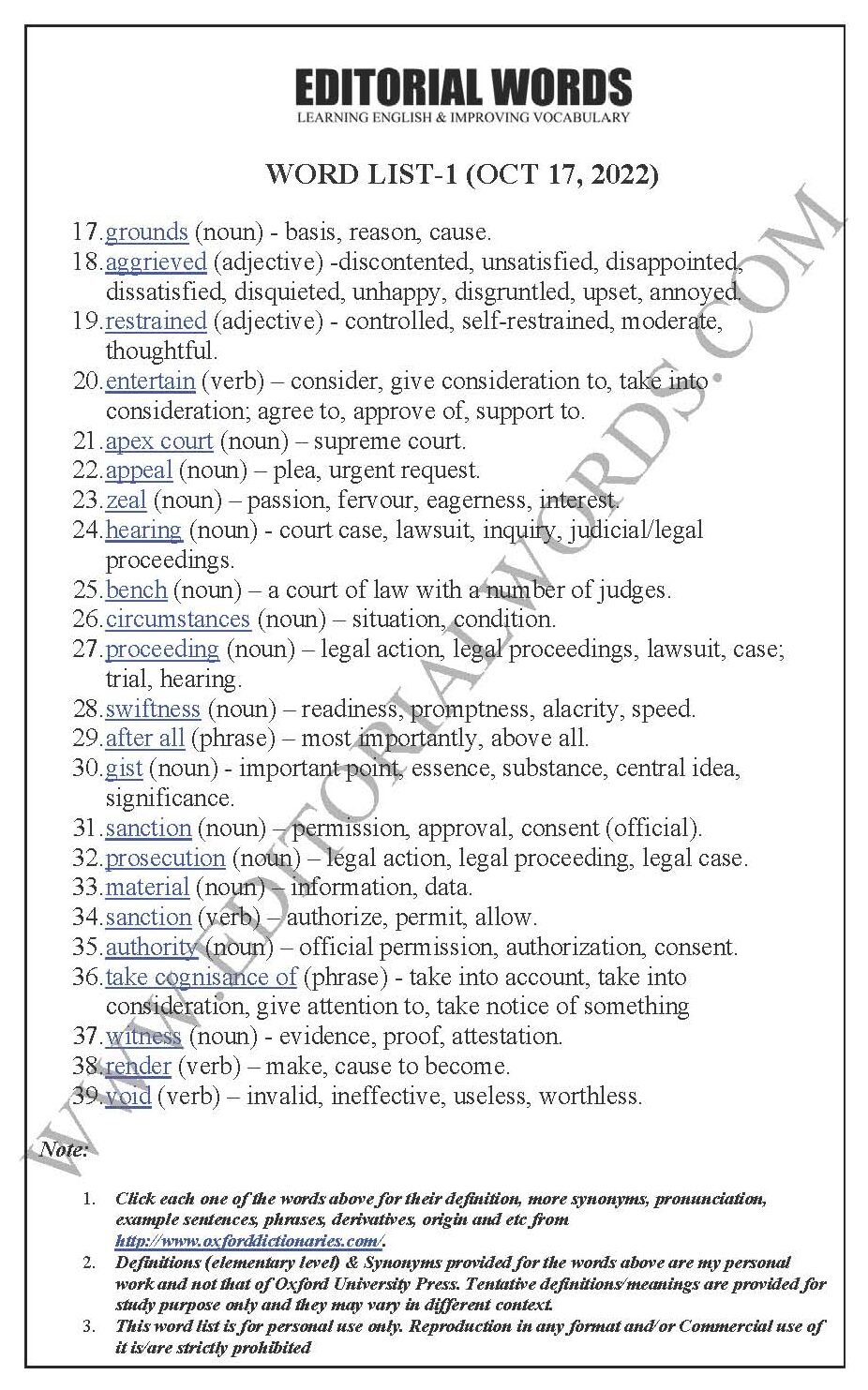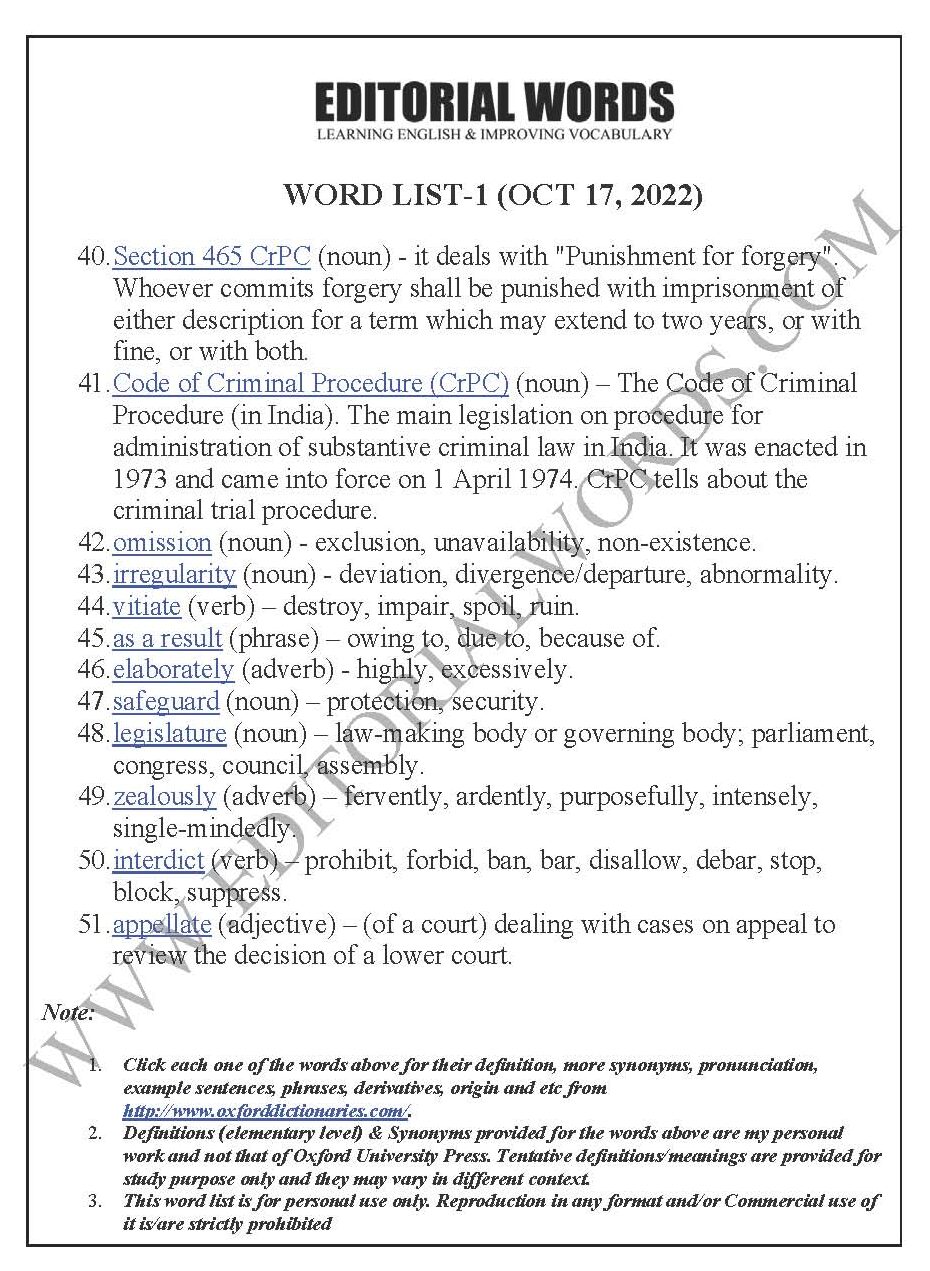The Hindu Editorial (Questionable urgency) – Oct 17, 2022
The manner in which the Supreme Court has suspended the operation of a Bombay High Court judgment discharging G.N. Saibaba and others in an alleged Maoist conspiracy case is quite unusual and raises critical questions. For further reading, visit “The Hindu”. Below is today’s word list-1 for The Hindu Editorial (Questionable urgency) – Oct 17, 2022.
To read this article, click “The Hindu”.
This preview is provided here with permission.
Courtesy: The Hindu
The Hindu Editorial (Questionable urgency) – Oct 17, 2022:
- stay order (noun) – it is defined as the act of temporarily stopping or postponing any judicial proceeding through the court or legal authorities in India, in order to secure the rights of a citizen.
- stay (verb) – stop, delay, or prevent something temporarily (a judicial proceeding/trial through the order of a court).
- acquittal (noun) – declaration of innocence, clearing, discharge, release, vindication, exoneration.
- show someone in a bad light (phrase) – to make someone appear to be a bad one.
- in a bad light (phrase) – in a method that makes someone or something to look bad; so as to give bad impression.
- alleged (adjective) – claimed, professed, purported, supposed, reported, ostensible.
- Maoist (noun) – a follower of Maoism (it originated in China as a form of communist theory derived from the teachings of Chinese political leader Mao Zedong).
- conspiracy (noun) – (unlawful) plan/plot, intrigue, collaboration/deception, collusion.
- quite (adjective) – somewhat, relatively, comparatively.
- conviction (noun) – sentence, judgement, verdict.
- trial court (noun) – a court of law where cases are tried at first. (try means to investigate and decide (a case) in a formal trial).
- sentence (verb) – pass judgement on, punish, convict.
- provision (noun) – clause, requirement, condition.
- Unlawful Activities (Prevention) Act (UAPA) (noun) – an Indian law aimed at effective prevention of unlawful activities associations in India. Its main objective was to make powers available for dealing with activities directed against the integrity and sovereignty of India.
- set aside (phrasal verb) – overrule, overturn, reverse, revoke, rule against, nullify, annul, cancel, quash, dismiss, reject.
- merits (noun) – an essential inherent quality (rights and wrongs only) while evaluating a case (not by external aspects).
- grounds (noun) – basis, reason, cause.
- aggrieved (adjective) -discontented, unsatisfied, disappointed, dissatisfied, disquieted, unhappy, disgruntled, upset, annoyed.
- restrained (adjective) – controlled, self-restrained, moderate, thoughtful.
- entertain (verb) – consider, give consideration to, take into consideration; agree to, approve of, support to.
- apex court (noun) – supreme court.
- appeal (noun) – plea, urgent request.
- zeal (noun) – passion, fervour, eagerness, interest.
- hearing (noun) – court case, lawsuit, inquiry, judicial/legal proceedings.
- bench (noun) – a court of law with a number of judges.
- circumstances (noun) – situation, condition.
- proceeding (noun) – legal action, legal proceedings, lawsuit, case; trial, hearing.
- swiftness (noun) – readiness, promptness, alacrity, speed.
- after all (phrase) – most importantly, above all.
- gist (noun) – important point, essence, substance, central idea, significance.
- sanction (noun) – permission, approval, consent (official).
- prosecution (noun) – legal action, legal proceeding, legal case.
- material (noun) – information, data.
- sanction (verb) – authorize, permit, allow.
- authority (noun) – official permission, authorization, consent.
- take cognisance of (phrase) – take into account, take into consideration, give attention to, take notice of something
- witness (noun) – evidence, proof, attestation.
- render (verb) – make, cause to become.
- void (verb) – invalid, ineffective, useless, worthless.
- Section 465 CrPC (noun) – it deals with “Punishment for forgery”. Whoever commits forgery shall be punished with imprisonment of either description for a term which may extend to two years, or with fine, or with both.
- Code of Criminal Procedure (CrPC) (noun) – The Code of Criminal Procedure (in India). The main legislation on procedure for administration of substantive criminal law in India. It was enacted in 1973 and came into force on 1 April 1974. CrPC tells about the criminal trial procedure.
- omission (noun) – exclusion, unavailability, non-existence.
- irregularity (noun) – deviation, divergence/departure, abnormality.
- vitiate (verb) – destroy, impair, spoil, ruin.
- as a result (phrase) – owing to, due to, because of.
- elaborately (adverb) – highly, excessively.
- safeguard (noun) – protection, security.
- legislature (noun) – law-making body or governing body; parliament, congress, council, assembly.
- zealously (adverb) – fervently, ardently, purposefully, intensely, single-mindedly.
- interdict (verb) – prohibit, forbid, ban, bar, disallow, debar, stop, block, suppress.
- appellate (adjective) – (of a court) dealing with cases on appeal to review the decision of a lower court.
Note:
1. Click each one of the words above for their definition, more synonyms, pronunciation, example sentences, phrases, derivatives, origin and etc from http://www.oxforddictionaries.com/.
2. Definitions (elementary level) & Synonyms provided for the words above are my personal work and not that of Oxford University Press. Tentative definitions/meanings are provided for study purpose only and they may vary in a different context.
3. This word list is for personal use only. Reproduction in any format and/or Commercial use of it is/are strictly prohibited.
The Hindu Editorial (Questionable urgency) – Oct 17, 2022:



“Phrasal Verbs” We Learnt Last Week
“Idioms & Phrases” We Learnt Last Week
“Important Definitions” We Learnt Last Week
Recent Word Lists For The Hindu Editorial Articles

Be the first to comment